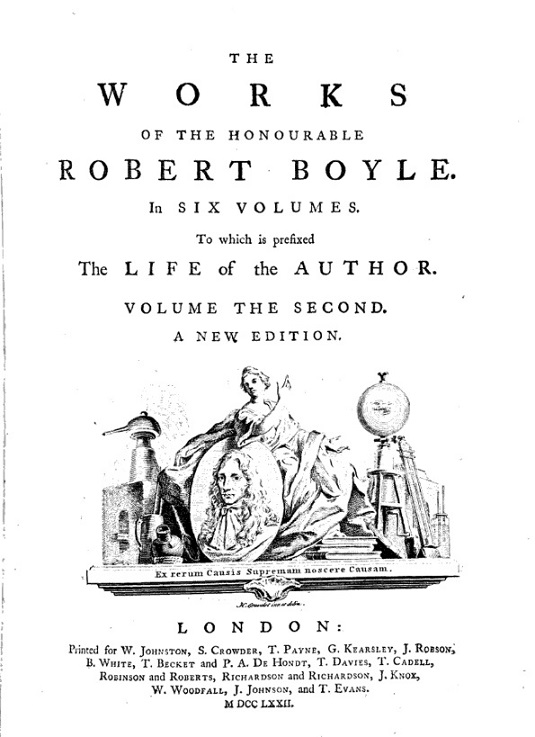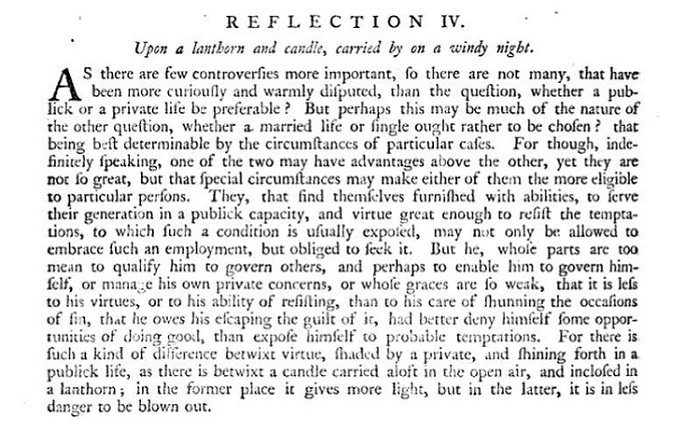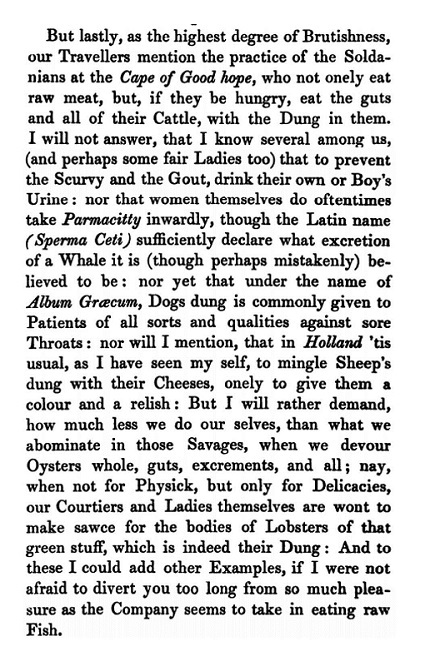| b. Lismore Castle, 25 Jan., a son of Richard Boyle, 1st Earl of Cork; ed. Eton, from aetat. 8; travelled on the continent with tutor, 1638; sent on European tour for six years, aetat 11, first to France, then Italy 1641; returned to Dorset, England, 1644; met with others of the ‘Invisible College’ dedicated the New Philosophy, in Gresham college, London, from 1644; set up laboratory in 1649; visited Ireland during 1652-53, and described it as ‘a barbarous country inimical to scientific thought’; moved to Oxford, 1654 [var. 1655]; employed Robert Hooke (1635-1703) and built air-pump [machina Boyleana] with him, 1659, an improvement on Otto von Guericke’s apparatus, leading to experiments with air; criticised by Franciscus Linus SJ; enunciated law that vol. of gases is inverse to pressure in reply to same at a constant temperature (‘Boyle’s Law’); |
| issued New Experiments Physio-Mechanical, Touching the Spring of the Air and Its Effects (1660), containing Boyle’s Law on the inverse relationship between the volume of a gas and its pressure; fnd. with others of the Invisible College a Royal Soc. of London for improving natural knowledge, with charter of Charles II, 1663; president, 1680, but declined through scruple about oaths; moved to London, 1668; d. 30 Dec. also fnd.-mbr. Dublin Philosophical Society [later RDS]; scientific and philosophical writings include The Sceptical Chymist (1661), attacking Aristotle and Paracelsus; clearly distinguished between compounds and mixtures; religious writings incl. Occasional Reflections (1665), ridiculed by Swift in “A Pious Meditation on a Broom Stick; in the Style, of the Honourable Robert Boyle”; moved to deep religious faith by a thunder-storm; studied scripture in ancient languages; supported reprinting of William Daniel’s 1602 translation of the New Testament into Irish, 1681; similarly contrib. to translation of Bible into Welch and Scots-Gaelic; |
| received transcripts of Bedell’s Bible prepared by Bishop Narcissus Marsh and Andrew Sall, and contributed £500 for the casting of a new Irish type font, designed by Moxon, 1685; endowed Boyle lectures ‘for proving the Christian Religion against notorious Infidels’; paid for reissue of OT and NT translations together, for use in Scotland as An Bíobla Naomtha (commonly called ‘Bedell’s Bible’); his Free Discourse Against Swearing was issued posthumously; left copious papers with particular instructions for their preservation except ‘a bundle of other Letters to be rifled, and the rest burnt’; a portrait by Friedrich Kerseboom is held with his natural history collections as a bequest in the Royal Society (London). RR ODNB DIB OCEL OCIL |
| [ top ] |
| Contemporary writings |
|
|
| Collected Works |
|
| Bibliography |
|
| Correspondence |
|
Bibliographical details
The Life of the Honourable Robert Boyle / By Thomas Birch, M.A. and F.R.S. [Birch’s life of Boyle; 1st Edn.] (London: Printed for A. Millar, over-against Catherine-Street in the Strand. MDCDXLIV [1744]), [6], 458, [16] p. ; 8°.
The Works of the Honourable Robert Boyle[,] in Six Volumes To Which is Prefixed The Life of the Author. Volume the Second. A New Edition. London: W. Johnson, S Crowder, T. Payne [... &c.] M DCC LXXII [1772] 
Available at Google Books online; accessed 01.01.2018; see extract, infra.
[ top ]
Criticism
Richard Ryan, ‘Hon. Robert Boyle’, in Biographia Hibernica, Irish Worthies (1821), Vol. I, p.153 [see extract]; K. Theodore Hoppen, ‘The Dublin Philosophical Society and the new learning in Ireland’, in Irish Historical Studies, 14 (1964-5), pp.99-118; M. Kathleen Lynch, Robert Boyle, Ist Earl of Orrery (Knoxville 1965); Barbara Beigun Kaplan, ‘Divulging of Useful Truths in Physick, The Medical Agenda of Robert Boyle (Baltimore: Johns Hopkins UP 1994); Michael Hunter, ed., Robert Boyle Reconsidered (CUP 1994); Robert Boyle by Himself and His Friends with a Fragment of William Wotton’s Lost ‘Life of Boyle’ (London: Pickering & Chatto 1994), 188pp. See also K. T. Hoppen, The Common Scientist in the Seventeenth Century: A Study of the Dublin Philosophical Society 1683-1708 (London:Routledge & Kegan Paul 1970).
| Richard Ryan, Biographia Hibernica: Irish Worthies, Vol. I [of 2] (London & Dublin 1819) |
|
[...] His complaints continuing still to increase, after a tedious and lingering illness, which may be regarded as a complete decay of nature, he departed this life on the 30th December, 1691; exactly one week after the decease of his dear sister Lady Ranelagh, which afflicted him so much, as no doubt to hasten that melancholy event. On the 7th of the following January, he was buried at St. Martin in the Fields; his funeral sermon being preached by Dr. Gilbert Burnet, whom he had much assisted in his publication of the History of the Reformation, and who had gratefully acknowledged his kindness in the preface to his second volume. He states in this sermon, that twenty-nine years of intimate conversation with Mr. Boyle, have enabled him to give a complete character of him. He descants upon his zeal for the christian religion, and mentions with particular approbation his foundation for lectures in its defence against deists, atheists, &c. without interfering with any of those points on which christians {174} are divided into sects; and which has since produced so many volumes of excellent discourses. He was at the expense of £700 for printing the Irish bible, which he caused to be distributed in that country, as well as large sums towards the Welch bible, and that in the Irish language for Scotland, besides many other gifts of a similar nature: In other respects, the bishop informs us, so great were his charities, that they amounted to upwards of £1,000 per annum. He then proceeds to enlarge upon Mr. Boyle’s astonishing abilities. After stating and extolling his knowledge of the Hebrew, of the fathers, and of the controversies on the Scriptures, his acquirements in the mathematics, particularly in geometry, his accurate and intimate acquaintance with geography and history, and his skill in physic; he says, “but for the history of nature, ancient and modern, of the productions of all countries, of the virtues and improvements of plants, of ores and minerals, and all the varieties that are in them in different climates, he was by very much the readiest and the perfectest I ever knew in the greatest compass, and with the nicest exactness. This put him in the way of making all that vast variety of experiments, beyond any man, as far as we know, that ever lived. And in these as he made a great progress in new discoveries, so he used so nice a strictness, and delivered them with so scrupulous a truth, that all who have examined them, have found how safely the world may depend upon them. But his peculiar and favourite study was chemistry, in which he was engaged with none of those ravenous and ambitious designs, which draw many into it. As he made chemistry much the better for his dealing in it, so he never made himself either the worse of the poorer for it. It was a charity to others as well as an entertainment to himself; for the produce of it was distributed by his sister and others into whose hands he put it.” Such is the character of Boyle, as delivered to us by {175} his great contemporary and intimate friend; and from the facts of his life, and the internal evidence of his writings, we cannot conceive that the hand of friendship: has been called upon to slur over the faults which might otherwise have appeared, or to place in a stronger light the virtues he possessed; to draw the character of Boyle it needed not the pen of a friend, it is handed down to us in his works of science, in his religious reflections, and in his deeds of charity. Mr. Boyle was in person, tall and slender, with a pale countenance, and a weakness in his eyes, which made him very careful of them. His constitution was so delicate, that he hadi cloaks of different. substances, to wear: when he went out, and which he put: on according to the thermometer, although he was in his infancy committed to the care of a country nurse, his father, as he informs us, “having a perfect aversion for the tenderness of those parents which made them breed: their children so nice and tenderly, that a hot sun or a good shower of rain, as much endangers them as if they were made of butter, or of sugar.” The effect of this hardy treatment was a strong and vigorous state of health, which was unfortunately soon destroyed on his return home, through too much indulgence and mistaken kindness. For the last forty years, of his life, so low were his health and spirits, that it was a wonder to all who knew him, how he could: read, study, make experiments, and write in the manner he did: He also had an impediment in his speech, which continued through the whole of his life, he having contracted it when a child, from mocking the stutter of other children of the same age. Mr. Boyle was never married though he is said by Evelyn to have formed an attachment to the interesting daughter of Cary, Earl of Monmouth; and: there is extant a letter of Dr. John Wallis to him, by which we find, that there was an overture made him with respect to Lady Mary Hasting, sister to the Earl of Huntingdon. Burnet {176} informs us that he refrained from marriage at first through prudential motives, and afterwards more philosophically; and from a letter of his to the Lady Barrymore his niece, which yet remains, we may infer that it was neither owing to a dislike to the sex, nor to an austerity of disposition, every word in it breathing the truest spirit of gallantry and politeness. In the habit of familiar intercourse with Charles II James II and William III all of whom were much attached to him, we might wonder that he was never raised to the peerage, especially as his four elder brothers were all of that rank. He was, however, in the habit of speaking his mind freely, with respect to the measures of government, and it might have been conceived that these kings, though pleased with him as a man, might think him unfit for a courtier, were it not that we are informed that the offer of a peerage was frequently made to him, and as constantly declined: That it is not in the power of titles to ensure fame, is evinced by two of his brothers, of whom we now know nothing but the name; while the history of the untitled Robert Boyle remains as a beacon to future ages, which points out exertion as the surest means of arriving at splendid celebrity. [Here lists posthumous works which,] joined to those before mentioned, together with his numerous scattered pieces in the Philosophical Transactions, have been collected together and published by Dr. Birch, in 6 vols. 4to. |
| See full copy in RICORSO > Library > Criticism > History > Legacy - via index, or as attached. |
[ top ]
Commentary
George Saintsbury, Short Hist. of English Literature [q.d.], 522f.: ‘The platitudinousness of the Hon. Robert Boyle (1626-1691), celebrated, or rather, immortalised, by Swift, is an unintentional reduction to the absurd of qualities which Sprat insisted on as necessary to the scientific man.’
William Reville, The Irish Times (8 March 2001) [science column], gives account: Robert Boyle, sent on European tour for six years, aged 11; returned to Dorset in 1644; set up laboratory in 1649; moved to Oxford, 1655; employed Robert Hooke (1635-1703); built air-pump; New Experiments Physio-Mechanical, Touching the Spring of the Air and Its Effects (1660), containing Boyle’s law on the inverse relationship between the volume of a gas and its pressure; believed with others that cosmical qualities transcended pure mechanical laws of the universe; v. religious; hostile to view of nature which sidelined God’s creation; attacked Aristotle and Paracelsus in The Sceptical Chymist (1661); proposed that elements were composed of ‘corpuscles’ organised as chemical substances; clearly distinguished mixtures and compounds; first scientist to collect a sample of a gas; endowed Boyle lectures ‘for proving the Christian Religion against notorious Infidels’; Free Discourse Against Swearing (posthum.).
Geoffrey Grigson, ‘Meanings of Landscape’, in Places of the Mind (London: Routledge 1944), p.99: ‘If I start saying “this particular rock is one of the oldest of the world’s rocks”, there is nothing to stop me wandering off into the earlier ages of the world, into the origins of continents, into Wegener’s theory of continental drift, into a mental walking tour through the reconstructed landscape of Godwanaland; whereas the here-and-now of the rock, and its plants and its lichens and its shape and its colour, its dryness or wateriness, is what affects me, makes me - or rather helps to make me-happy or elated, or comfortable, or disturbed. / This is not making a fashionable long nose at science. Only, landscape is you and me, and here and now, decidedly. No matter what science explains we stick to our senses. The great Robert Boyle, with the admirable pride of a seventeenth-century virtuoso and Fellow of the Royal Society, could not understand why sensible men had ever felt a divinity about the moon [quotes]: / “The moon which was anciently a principal deity, is so rude and mountainous a body, that ‘tis a wonder speculative men, who consider’d how many, how various, and how noble functions belong to a sensitive soul, could think a mass of matter, so very remote from being fitly organiz’d, should be animated and govern’d by a true, living and sensitive soul.”’ But we still admire the mass of matter, and give it a personality [99] if not a divinity. Long after Boyle was dead and buried, Coleride (who was not an unscientific poet) founded the philosophy of his life on the personified Evening Star, which he gazed at from the lead roofs of Christ’s Hospital.’ (pp.99-100.)
[ top ]
| The Works of the Honourable Robert Boyle in Six Volumes To Which is Prefixed The Life of the Author. Volume the Second. A New Edition. London: W. Johnson, S Crowder, T. Payne [... &c.] M DCC LXXII [1772] - Reflection III: "On the Eating of Oysters" pp.450-52; p.451. |

|
| Available at Google Books - online; accessed 01.01.2018. |
[ top ]
References
Margaret Drabble, ed., Oxford Companion of English Literature (OUP: 1985), cites early romances, Seraphic Love and Martyrdom of Theodora, the latter turned into a libretto for Handel. Swift and Butler wrote parodies of his Occasional Reflections (1665), a work which supplied Swift with a central line in Gulliver’s Travels. Boyle paid for a translation of the New Testament into Irish and other languages. NOTE err, Occasional Reflections provided themes for Gulliver’s Travels
Henry Boylan, Dictionary of Irish Biography (Dublin: Gill & Macmillan 1988): recte, ridicule in Notes on a Broomstick.
Marsh’s Library, Dublin holds copies of 20 original letters from Hon. Robert Boyle to Narcissus Marsh, while Proost of Trinity Colelge, and bishop of Ferns and Lieghlin; respecting the publication of the Old Testament in Irish [MS 1682-4; 49 fols.]; presented by Charles E. Orpen, 1836. (See Muriel McCarthy and Caroline Sherwood-Smith, eds., Hibernia Resurgens: Catalogue of Marsh’s Library, 1994, p.30.]
Perseus at Tufts contains “Robert Boyle’s Work Diaries I-XXXVIII ” as digitised text (254,000-word plus, with biog. and bibl.) at www.perseus.tufts.edu [Boyle link].
[ top ]
Notes
Irish-ish: Boyle called himself ‘Irish by birth, but not by ancestry, residence or inclination’ (see Ann Stewart, 50 Irish Portraits, National Gallery, 1986).
Swift connection: Boyle’s Vindication cited in Encyclopedia Britannica article on Jonathan Swift as the subject of Swift’s Battle of the Books, in that Boyle wrote to put down Wotton and Bentley’s criticisms of Sir William Temple’s Essay on Ancient and Modern Learning (1692); but query, the latter published a year after the death of Boyle.
Books reviewed: Michael Hunter, ed., Robert Boyle Reconsidered (CUP [1994]), reviewed with other works including sections on Boyle, in Times Literary Supplement (6 Jan. 1995), [q.p.], where Rupert Hall, Afterword to Renaissance and Revolution: Humanists, scholars, craftsmen and natural philosophers in early modern Europe (CUP [1994]) is also cited [note conjectural dates]; review includes reference to remark of John Locke lumping Boyle with writers on husbandry, planting and gardening as fit for gentlemen ignorant of mathematics.
[ top ]
